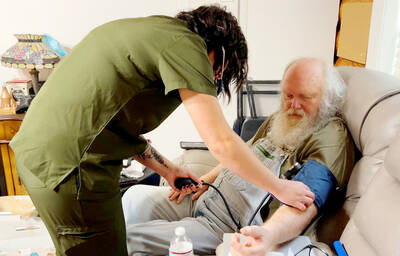Dark eyes peep bashfully over a black, sequined veil. Silver tassels tremble as the belly dancer's hips move in a sweeping circle.
His sideburns and muscular torso are less typical. Beirut's celebrated male belly dancer, Mousbah Baalbaki, has taken the floor.
To the cheers and whistles of the audience, the veil is thrown aside and the dancer picks up a gold cane. Holding it with his fingertips and biting his lips, he playfully taps his thighs with the cane and leans back, shimmying his shoulders.

PHOTO: REUTERS
The drums quicken and pound. Mousbah bounds across the stage moving his hips and shoulders faster and faster to a blur of silver tassels and chains. Head thrown back, mouth open, eyes half closed, he looks as mesmerized as his whooping, stamping audience.
"He's the best dancer I've seen. The music, the show, everything just puts a kind of spell on you," said Nassim Shadi, 23.
Mousbah is a showman, 1.8m tall and wearing stage makeup and with his own take on street style: tasselled satin combats, ripped jeans jangling with belts and chains, tiger-print see-through tops, bandanas -- a new outfit for every show.
"I'd prefer this if he was a woman, I think," said Faisal Shams, 28, who faces the other way for much of the show. "Though he's a great dancer, better than most of the women who do belly dancing."
Being a man in what is seen as a woman's role was hard at first for 31-year-old Mousbah, a Sunni Muslim who grew up in Sidon, a large town in Lebanon's conservative south. "At first my family were against it, but with success they started to accept what I did. Now it's normal because I've made my name."
"EVERYTHING UNUSUAL ATTRACTS"
Mousbah's act has proved a hit in cosmopolitan Beirut where he has regular bookings at clubs and gives occasional performances at wedding receptions. An album of music for belly dance is soon to come out in his name.
"It's great to watch but I think people like it partly because it's weird, and in Beirut everything goes in fashions," said Layla Abdullah, 31, watching Mousbah at Music Hall, a new live act venue where clubbers book weeks ahead to get in.
Nazih Khater, arts columnist for the leading daily An-Nahar agrees. "Everything unusual attracts. But he is nonetheless an artist, he has creativity, style and personality, which makes him a star."
At private family gatherings, Khater says, it is normal for Lebanese men and women to dance the same undulating moves, thought to trace to sacred rites performed by their ancient forefathers, the Phoenicians. "But if a man did that in public, normally people would laugh," he said.
Mousbah and the others might be seen as of dubious repute elsewhere in the Arab world, Khater said. "In Lebanon people rate culture highly, they appreciate Mousbah as an artist and make an exception."
Mousbah says that apart from the odd comment or sarcastic look, he has never been harassed. "I love Lebanon, I love this society and it's changing, even the mentality. I'm not seeking to liberate, I'm liberated by myself."
BREAKING DOWN BARRIERS
Beirut's hedonistic nightlife has made it the undisputed party capital of the Middle East. Alcohol is widely drunk and single men and women go out together to streets spilling over with bars.
But they go home to parents in close-knit communities and face strong pressure to have a family. Being gay is taboo to many Lebanese, whether Christian or Muslim, and gays run the risk of being charged with "unnatural sex" under the country's law.
Police largely turn a blind eye to a handful of known gay bars, and Khater says most people's attitude is "live and let live. It's not accepted, but it's not a drama".
Mousbah's performance of a dance hitherto reserved for women -- mixing slapping his own buttocks with more classical steps -- was bound to be risque. He seems at ease with controversy.
"I'm breaking down barriers but not on purpose. I never did this thinking I wanted to change society. I'm just a dancer."

Oct. 27 to Nov. 2 Over a breakfast of soymilk and fried dough costing less than NT$400, seven officials and engineers agreed on a NT$400 million plan — unaware that it would mark the beginning of Taiwan’s semiconductor empire. It was a cold February morning in 1974. Gathered at the unassuming shop were Economics minister Sun Yun-hsuan (孫運璿), director-general of Transportation and Communications Kao Yu-shu (高玉樹), Industrial Technology Research Institute (ITRI) president Wang Chao-chen (王兆振), Telecommunications Laboratories director Kang Pao-huang (康寶煌), Executive Yuan secretary-general Fei Hua (費驊), director-general of Telecommunications Fang Hsien-chi (方賢齊) and Radio Corporation of America (RCA) Laboratories director Pan
The consensus on the Chinese Nationalist Party (KMT) chair race is that Cheng Li-wun (鄭麗文) ran a populist, ideological back-to-basics campaign and soundly defeated former Taipei mayor Hau Lung-bin (郝龍斌), the candidate backed by the big institutional players. Cheng tapped into a wave of popular enthusiasm within the KMT, while the institutional players’ get-out-the-vote abilities fell flat, suggesting their power has weakened significantly. Yet, a closer look at the race paints a more complicated picture, raising questions about some analysts’ conclusions, including my own. TURNOUT Here is a surprising statistic: Turnout was 130,678, or 39.46 percent of the 331,145 eligible party

The classic warmth of a good old-fashioned izakaya beckons you in, all cozy nooks and dark wood finishes, as tables order a third round and waiters sling tapas-sized bites and assorted — sometimes unidentifiable — skewered meats. But there’s a romantic hush about this Ximending (西門町) hotspot, with cocktails savored, plating elegant and never rushed and daters and diners lit by candlelight and chandelier. Each chair is mismatched and the assorted tables appear to be the fanciest picks from a nearby flea market. A naked sewing mannequin stands in a dimly lit corner, adorned with antique mirrors and draped foliage

The older you get, and the more obsessed with your health, the more it feels as if life comes down to numbers: how many more years you can expect; your lean body mass; your percentage of visceral fat; how dense your bones are; how many kilos you can squat; how long you can deadhang; how often you still do it; your levels of LDL and HDL cholesterol; your resting heart rate; your overnight blood oxygen level; how quickly you can run; how many steps you do in a day; how many hours you sleep; how fast you are shrinking; how